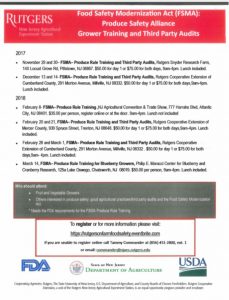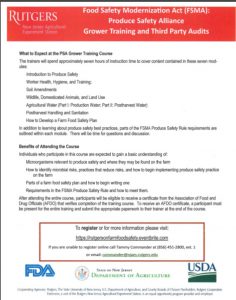Do you need the FSMA Produce Safety Rule training? Third Party Audit training? Choose one or both days of our upcoming workshops. Remember, the FSMA Produce Safety Rule does not require training each year for compliance, but your third party auditor may require it! Register online at rutgersonfarmfoodsafety.eventbrite.com or call Tammy Commander at (856) 451-2800, ext. 1 or email commander@njaes.rutgers.edu
2017/2018 Farm Food Safety Certificate Trainings
Registration required!
2017
November 29 and 30
FSMA-Produce Rule Training and Third Party Audits, Rutgers Snyder Research Farm, 140 Locust Grove Rd, Pittstown, NJ 08867. $50.00 for day 1 or $75.00 for both days, 9am-4pm. Lunch included.
December 13 and 14
FSMA-Produce Rule Training and Third Party Audits, Rutgers Cooperative Extension of Cumberland County, 291 Morton Avenue, Millville, NJ 08332. $50.00 for day 1 or $75.00 for both days,9am-4pm. Lunch included.
2018
February 8th
FSMA- Produce Rule Training ,NJ Agricultural Convention & Trade Show, 777 Harrahs Blvd, Atlantic City, NJ 08401. $35.00 per person, register online or at the door. 9am-4pm. Lunch not included
February 20 and 21
FSMA- Produce Rule Training and Third Party Audits, Rutgers Cooperative Extension of Mercer County, 930 Spruce Street, Trenton, NJ 08648. $50.00 for day 1 or $75.00 for both days,9am-4pm. Lunch included.
February 28 and March 1
FSMA- Produce Rule Training and Third Party Audits, Rutgers Cooperative Extension of Cumberland County, 291 Morton Avenue, Millville, NJ 08332 . $50.00 for  day 1 or $75.00 for both days,9am- 4pm. Lunch included.
day 1 or $75.00 for both days,9am- 4pm. Lunch included.
March 14th
FSMA- Produce Rule Training for Blueberry Growers, Philip E. Marucci Center for Blueberry and Cranberry Research, 125a Lake Oswego, Chatsworth, NJ 08019. $50.00 per person, 9am-4pm. Lunch included.
Register online at rutgersonfarmfoodsafety.eventbrite.com or call Tammy Commander at (856) 451-2800, ext. 1 or email commander@njaes.rutgers.edu
